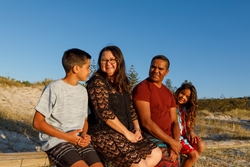2021-22 Federal Budget
The 2021-22 Federal Budget presents a foundational shift in the national response to mental health, wellbeing and suicide prevention.
It comes at a time when more Australians than ever are recognising the importance of seeking help for their mental ill health, and governments and the sector are united in their commitment to meet this need.
It forms the Australian Government’s initial response to recent reform recommendations, including the Productivity Commission Inquiry into Mental Health and the National Suicide Prevention Final Advice. The reform agenda and reports have drawn widely on the experience and expertise of stakeholders from across the sector, including clinicians, researchers and those with lived and living experience. The result is a preventative, compassionate and person-centred approach to mental health and suicide prevention.
Importantly, through working towards a National Agreement, this budget recognises that to achieve coordinated integrated services we need to adopt a coordinated way of doing things, across all jurisdictions and in partnership with all stakeholders.
The $2.3 billion commitment leads a shift to:
-
- Focusing on the value of investing in mental health and wellbeing for all Australians, not just how much we spend on mental illness.
- Significantly increasing accessibility to services online and in communities where people live, learn and work. A new network of community-based mental health hubs for children and those who care for them, young people and adults that will ensure those services are age and needs appropriate.
- Supporting our mental health workforce, across multiple disciplines, to deliver compassionate evidence based quality care.
Access the Federal government’s Mental Health budget documents including:
- Full budget papers
- A media release from The National Mental Health Commission
- National Mental Health and Suicide Prevention Plan
Below, the Commission has created a summary of the mental health budget commitments and how they relate to specific priority populations and service requirements.
Aboriginal and Torres Strait Islander Peoples
To be effective, mental health supports must be considerate of diverse experiences, cultures and environments that may make some people more susceptible to mental ill-health and suicide. Recognising that a one size fits all approach is not suitable, mental health services need to be accessible for those who are seeking support.  There is enormous wisdom in the way Aboriginal and Torres Strait Islander communities approach issues of social and emotional wellbeing. Therefore, it’s appropriate that we support Indigenous-led organisations to drive culturally-appropriate responses. One such response announced in this budgets is the partnership between Gayaa Dhuwi and Lifeline to provide a 24/7 Crisis Line.
There is enormous wisdom in the way Aboriginal and Torres Strait Islander communities approach issues of social and emotional wellbeing. Therefore, it’s appropriate that we support Indigenous-led organisations to drive culturally-appropriate responses. One such response announced in this budgets is the partnership between Gayaa Dhuwi and Lifeline to provide a 24/7 Crisis Line.
Children and Families
 The foundations for lifelong mental health and wellbeing are built during childhood. Children with good mental health and wellbeing are more likely to reach their full potential, have fulfilling relationships, and be able to adapt to and cope with adverse circumstances. The initiatives supported within the 2021-22 Budget will help to bring service options specifically for children and their families into community settings. By establishing a network of hubs, a new approach is being taken to bring into effect a more coordinated approach that is provided by multidisciplinary teams – across general practitioners, mental health professionals and allied health services. This will help improve service navigation, coordination of care, and quality of care.
The foundations for lifelong mental health and wellbeing are built during childhood. Children with good mental health and wellbeing are more likely to reach their full potential, have fulfilling relationships, and be able to adapt to and cope with adverse circumstances. The initiatives supported within the 2021-22 Budget will help to bring service options specifically for children and their families into community settings. By establishing a network of hubs, a new approach is being taken to bring into effect a more coordinated approach that is provided by multidisciplinary teams – across general practitioners, mental health professionals and allied health services. This will help improve service navigation, coordination of care, and quality of care.
LGBTQI+
Although many lesbian, gay, bisexual, transgender, intersex, queer and gender diverse (LGBTIQ+) people live healthy and happy lives, research has demonstrated that a disproportionate number experience poorer mental health outcomes and have higher risk of suicidal behaviours than their peers. Evidence shows that the discrimination and marginalisation experienced by LGBTIQ+ people increases the risk of developing mental health issues, and also creates barriers to accessing supportive services.
All services need to be inclusive, respectful and supportive of every Australian.
Rural and Remote Communitites
Australians living in rural and remote regions face unique challenges due to their geographic location and often have poorer health outcomes than people living in metropolitan areas.
The reported prevalence of mental illness in rural and remote Australia appears similar to that of major cities. However, access to mental health services is substantially more limited than in major cities. Rates of self-harm and suicide increase with remoteness.
The expansion of the Head to Health network and satellite services and the investment in digital supports will increase the opportunity to provide interventions earlier in life and in illness for people living in rural and regional areas.
Suicide Prevention
 This budget presents significant funding for suicide prevention. It is the first budget in response to the National Suicide Prevention Final Advice and the Productivity Commission into Mental Health and Suicide Prevention.
This budget presents significant funding for suicide prevention. It is the first budget in response to the National Suicide Prevention Final Advice and the Productivity Commission into Mental Health and Suicide Prevention.
While many of the initiatives announced in the Budget will benefit multiple cohorts, those highlighted below are specifically supporting initiatives that will assist to reduce suicide through early intervention and prevention.
Men
One in five Australian adults experience a mental illness in any year and almost half the total Australian population will experience a mental disorder at some time in their lives. The level of diagnosed mental illness in men is very high. Adult men are the most likely group to die by suicide or be at risk to suicide. Ongoing improvements to system and services that increase accessibility, and support men to appreciate the mental health and wellbeing are welcome.
While many of the 2021-22 Budget initiatives are designed to provide universal access to support for all Australians, there are specific initiatives to reduce barriers to help-seeking behaviour and target industries that predominantly employ men.
Older Australians
 Mental health and wellbeing is as important in older age as any other time of life. A key to ensuring older people live a good quality of life as they age, is their ability to support access to preventative mental health services.
Mental health and wellbeing is as important in older age as any other time of life. A key to ensuring older people live a good quality of life as they age, is their ability to support access to preventative mental health services.
Veterans
Veterans and their families face unique experiences during a military career, and in transitioning to civilian life.
Military life can involve significant challenges, not least the exposure to life and death situations. For many veterans, military service and operational deployment can also lead to a strong sense of identity and belonging.
While some initiatives for the defence family are referenced in the mental health budget package, there are specific and separate measures included in the Department of Veterans Affairs budget related to mental health services and programs for veterans.
Prior to the Budget, the government announced its commitment to a Royal Commission into Defence and Veterans Suicide. It is expected to examine the systemic issues and any common themes and past deaths by suicide of Australian Defence Force members and veterans and the experience of members and veterans who may continue to be at risk of suicide.
Women
While many of the 2021-22 Budget initiatives are designed to provide universal access to support for both men and women, there are a number of initiatives that have been designed for challenges that disproportionately affect women.
Young People
Over 75% of mental health challenges occur before the age of 25. One in seven young people aged 4 to 17 years’ experience a mental health condition in any given year, and young people are less likely than any other age group to seek professional help.
The changes committed to in the 2021-22 Budget will increase service options and accessibility, and help to normalise help-seeking behaviour. There are a number of initiatives which include targeted support for young people, aimed at ensuring they can access services when and where they need them.
Learn more
People with a complex and enduring mental illness
More than 690,000 Australians live with complex and enduring mental illness such as psychotic illnesses, personality disorders, bipolar disorder or severe and persistent depression and anxiety. People living with complex and enduring mental illness can experience a range of poorer health and social outcomes which can be driven by stigma and discrimination from the broader community.
Learn more.
Parents and carers
Carers, family and friends of people living with mental health challenges can experience feelings of isolation, fear and doubt that can become overwhelming.
Learn more.
Mental health and suicide prevention workforce
The members of this critical workforce support people across the full mental health continuum and frequently face challenging situations such as lack of access to resourcing, highly distressed patients and compassion fatigue. Ensuring our mental health workforce is supported to provide compassionate safe care is a critical enabler for our system and service reform.
The Budget seeks to increase capacity and improve capability of our mental health workforce. It recognises the importance of our GP’s, psychiatrists, psychologists, nurses and allied health professionals. Most importantly it recognises and supports investment in our peer workforce.
Learn more.




